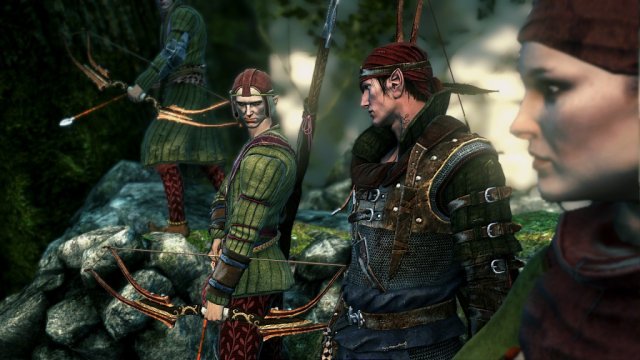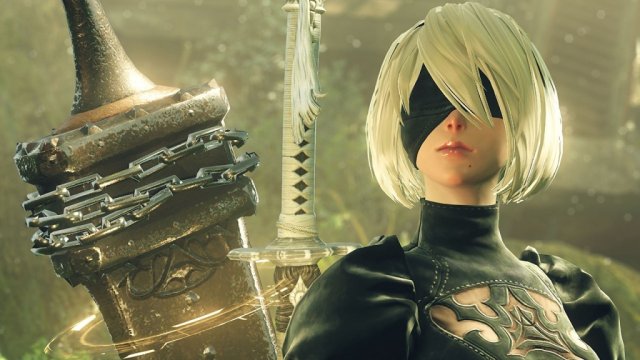Before we start take note if you haven’t played Witcher 3 or Nier: Automata do not read this article from feminist frequency! It contains massive spoilers for both games, and this article will contain spoilers for Witcher 3. I will be dealing exclusively with the Witcher 3 part of the article as I have been a long time fan of the franchise as well as the books by Andrzej Sapkowski. So let’s dive right into feminist frequencies latest article written by Carolyn Petit on the 12th of July:
“I have plenty of gripes with it. It egregiously sensationalizes violence against women, repeatedly putting the bodies of female murder victims on sexualized display.” Sensationalizes of violence against woman? Ignoring, of course, the countless (male) civilians you see dangling from nooses the moment you start the game. I am sorry, but did you actually take note of the setting that the Witcher 3?

It is the world that is in constant war and turmoil, where those with no power or money are used and abused by those who do have. This also applies to men, the innocent and children as well. And The Witcher does not shy away from showing those horrors. So why should the woman in the world of Witcher be exempt from this? Yes the world of the Witcher 3 is indeed misogynistic, does it mean that all of the women in the Witcher 3 are powerless? No, it is not as the Witcher 3 has an amazing cast of woman including Cirilla, Yennefer, Triss Merigold, Philippa Eilhart, Keira Metz, Anna Henrietta, Ves, Cerys an Craite and Priscilla. All of these women are strong, powerful and independent in their own right. But I am sure while writing her article that Carolyn conveniently forgot about them.
“Like many stories, it tries to address real-world issues of persecution by using mages and nonhumans as stand-ins for actual marginalized groups, but it does so while glorifying whiteness and taking place in a world populated almost entirely by white people.”
The world of The Witcher 3 is a fantasy world. Sure, it has some grounds in real life, but it’s still a fantasy world, that means it in no way has to follow any real life example by any means. It simply doesn’t have to capitulate to your virtual diversity check box. I don’t think diversity of any kind simply makes a game “better” so you can have every color of the rainbow in your game. But if it is not backed up by good story telling and solid writing then it is going to be garbage. As Mass Effect: Andromeda clearly demonstrated that this way of thinking does not work, if good writing is not present it all falls flat.

But having said that, racism in most western fantasy video games including the Dragon Age series is traditionally portrayed as persecution of magic users by those who do not use it, or is shown in a more traditional way where the majority of humans are racist and classist towards those who aren’t human. Racism takes on many shapes and forms, it is not always just based on color as the writer wants us to believe. The Scoia’tael are a metaphor for all oppressed people in the real world regardless of the color of their skin. I find it rather ironic that this fact eludes these people who can’t seem to see past the color of the skin of the character in the Witcher 3. But then again it just shows you how shallow their understanding of the story is, even when the game goes out of its way to spell it out during the course of the game. (Oppressing and abusing people is bad, duh!)
"Geralt exemplifies the boundaries of traditional masculinity typified by early Clint Eastwood heroes, and he and his fellow witchers only seem to be able to express their love for each other after they’ve had several drinks. His extremely reserved demeanor makes it so that the slightest cracking of a smile or the smallest tender gesture for Ciri can seem like a massive outpouring of emotional expression, which, let’s be clear, it isn’t.”
Geralt himself states during the course of the third game that Witchers suffer from dampened emotions, due to the trauma experienced at Uma’s trail as a child. Not to mention taking “Trial of the Grasses” as a child, which ended up killing a third of all the children. And if they managed to survive the half a dozen experiments that were performed on them, they were left with both mentally and physically scarred.

And all those experiments performed on them left all the witchers sterile and unable to reproduce, which also explains Geralts undying love for Cirilla, as he is unable to father a child of his own. Another thing to consider is how long-lived Witchers really are. Geralt is around 100 years old. If you have been around for a 100 years, exploring the known and unknown worlds slaughtering the worst monsters you can find, and seeing the worst that humanity has to offer. Seeing all of those horrors is sure to change your psychological profile, which will definitely change over time to the point of almost complete “been there, done that” detachment. So considering the above would you expect someone like Geralt to be an upbeat and happy individual? And to be honest I would take Geralt’s dry sarcastic stoicism over any of the garbage Bioware has written recently.
“But while I constantly hope for games that give us models of more emotionally expressive men, I also accept that Geralt is who he is, and that he conducts himself with a particular kind of old-fashioned masculine decency, a kind that’s as limiting as it is virtuous.”
Where have you been the last 10 years? There are plenty of emotionally expressive men in video games. Joel (The Last of Us), Henry (Firewatch), Ronan (Murdered: Soul Suspect), Nathan (Uncharted), Ethan (Heavy Rain) and I am sure I am missing another dozen or so names on that list. But like always if you want to spin a narrative in your favor it is best to ignore these examples entirely because it will go against everything you have been saying about the video game industry. And that would mean that you need to admit that you were wrong.

“Of course, there’s a kind of truth in what Geralt is saying, but it’s his defeatist acceptance of it that I want to dispute. In broad terms, he’s right when he says that humans fear “the alien, the odd,” but it’s also true that we can work against the kind of ignorance that allows fear and hatred to fester; even if we may never be able to eradicate it completely, we can work toward a global view that is rooted in compassion and a deep sense of interconnectedness, rather than a sense of division, otherness, and fear.”
The Witcher and Geralt’s story has never been about him trying to change the world he lives in for the better, it is him trying to survive and make a living as a Witcher. He just ends up being caught up in the power struggle of others. As powerful as Geralt is, there are forces and powers that are even beyond his control.
Modern games like the Witcher series are able to challenge the belief of people through good storytelling. There are no clear good and evil in the Witcher universe, and the gallery of characters are extremely large. This makes for complex story telling and an amazing cast of characters with deep backstories, much like Game of Thrones. You don’t need to look further than “The Bloody Baron” quest line. The scene with the Baron and Geralt sitting next to the fire and he explains everything that happened to him, I will not lie, I teared up. He sounded like a broken man, so sad, and filled with endless remorse for what he has done. The drinking, the miscarriage, and how he was abusive towards his wife, and how he loved his daughter with everything he had. It was one of the greatest, most powerful quests in a role playing game I have ever experienced.

I find it kind of ironic that Carolyn Petit lambasts the Witcher 3 for all it’s “supposed” transgressions using the virtual check box of everything that is wrong with the game but then turns around and praises Nier Automata. While ignoring the very same rules she applied to the Witcher. This issue becomes even more glaring when you consider there is not a single person of color to be found in Nier Automata if we use the fact that she complained about it in the first part of the article. Not forgetting that she complains about the over sexualization of Yennefer and how she always positions herself just right so that the player can take a look at her ass. All while ignoring the fact that you are staring at 2B’s ass for the entirety of the game. So I have to ask Carolyn, why the double standards? Why is one standard good enough for one game but not for another? Seems a bit biased…
[Editorial Note:] And then feminist frequency wonders why they aren’t taken seriously by the gaming community at large.
